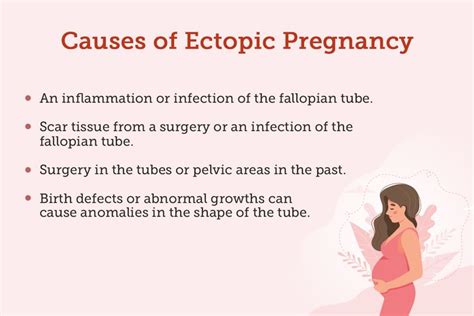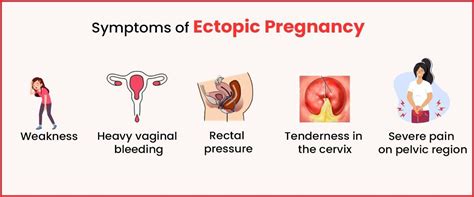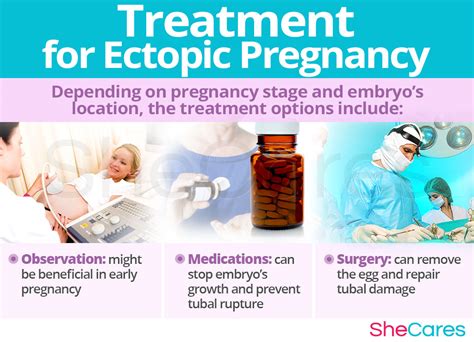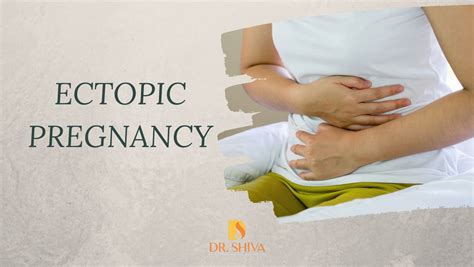Intro
Learn about ectopic pregnancy symptoms, causes, and risk factors, including abdominal pain, vaginal bleeding, and fallopian tube damage, to understand this life-threatening condition.
An ectopic pregnancy is a serious and potentially life-threatening condition that occurs when a fertilized egg implants outside the uterus, usually in the fallopian tube. This type of pregnancy is not viable and can cause severe complications for the mother. It is essential to understand the symptoms and causes of ectopic pregnancy to seek medical attention promptly. Every year, thousands of women experience ectopic pregnancies, and it is crucial to raise awareness about this condition to prevent unnecessary risks and complications.
Ectopic pregnancies can be asymptomatic in the early stages, making it challenging to diagnose. However, as the condition progresses, women may experience a range of symptoms, including abdominal pain, vaginal bleeding, and pelvic tenderness. In some cases, women may also experience shoulder pain, which is caused by blood accumulating in the abdominal cavity and irritating the diaphragm. It is crucial to seek medical attention immediately if you experience any of these symptoms, especially if you are pregnant or suspect you may be pregnant.
The importance of understanding ectopic pregnancy symptoms and causes cannot be overstated. Early diagnosis and treatment can significantly improve outcomes and reduce the risk of complications. Moreover, raising awareness about ectopic pregnancy can help women take preventive measures and seek medical attention promptly if they experience any symptoms. In this article, we will delve into the world of ectopic pregnancy, exploring its causes, symptoms, diagnosis, treatment, and prevention. We will also examine the risk factors associated with ectopic pregnancy and discuss ways to reduce the risk of this condition.
Ectopic Pregnancy Causes

The fallopian tube is a narrow, muscular tube that connects the ovary to the uterus. In a normal pregnancy, the fertilized egg travels through the fallopian tube and into the uterus, where it implants and develops. However, in an ectopic pregnancy, the fertilized egg implants outside the uterus, usually in the fallopian tube. This can cause the tube to rupture, leading to severe bleeding and potentially life-threatening complications. Understanding the causes of ectopic pregnancy can help women take preventive measures and seek medical attention promptly if they experience any symptoms.
Risk Factors Associated With Ectopic Pregnancy
Several risk factors are associated with ectopic pregnancy, including age, smoking, and previous ectopic pregnancy. Women over 35 years old are at higher risk of experiencing an ectopic pregnancy, as are women who smoke or have a history of pelvic surgery. Additionally, women who have had a previous ectopic pregnancy are at higher risk of experiencing another ectopic pregnancy. It is essential to understand these risk factors to take preventive measures and seek medical attention promptly if you experience any symptoms.Ectopic Pregnancy Symptoms

Abdominal pain is a common symptom of ectopic pregnancy, and it can range from mild to severe. The pain may be constant or intermittent and can be accompanied by vaginal bleeding or pelvic tenderness. In some cases, the pain may be severe and debilitating, requiring immediate medical attention. Vaginal bleeding is another common symptom of ectopic pregnancy, and it can range from light to heavy. The bleeding may be accompanied by abdominal pain or pelvic tenderness, and it can be a sign of a ruptured fallopian tube.
Diagnosing Ectopic Pregnancy
Diagnosing ectopic pregnancy can be challenging, as the symptoms can be similar to those of other conditions, such as miscarriage or ovarian cysts. However, a combination of physical examination, medical history, and diagnostic tests can help diagnose ectopic pregnancy. A pelvic exam can help identify tenderness or pain in the pelvic area, while a pregnancy test can confirm pregnancy. Imaging tests, such as ultrasound or CT scan, can help identify the location of the fertilized egg and confirm the diagnosis of ectopic pregnancy.Treatment Options For Ectopic Pregnancy

Surgery is often necessary to treat ectopic pregnancy, especially if the fallopian tube has ruptured. The type of surgery used depends on the severity of the condition and the overall health of the woman. In some cases, a laparoscopic surgery may be used to remove the fertilized egg and repair any damage to the fallopian tube. In other cases, an open surgery may be necessary to repair a ruptured fallopian tube and prevent further complications. Medication may also be used to treat ectopic pregnancy, especially if the condition is diagnosed early.
Preventing Ectopic Pregnancy
While it is not possible to completely prevent ectopic pregnancy, there are steps that women can take to reduce their risk. Practicing safe sex, avoiding smoking, and maintaining a healthy weight can help reduce the risk of ectopic pregnancy. Additionally, women who have had a previous ectopic pregnancy should take extra precautions to prevent another ectopic pregnancy. This may involve using birth control or avoiding fertility treatments.Raising Awareness About Ectopic Pregnancy

Ectopic pregnancy is a serious condition that requires immediate medical attention. By understanding the symptoms and causes of ectopic pregnancy, women can take preventive measures and seek medical attention promptly if they experience any symptoms. Raising awareness about ectopic pregnancy can help prevent unnecessary risks and complications and improve outcomes for women who experience this condition.
Conclusion And Next Steps

We invite you to share your experiences and thoughts about ectopic pregnancy in the comments section below. Your input can help raise awareness about this condition and improve outcomes for women who experience it. Additionally, if you have any questions or concerns about ectopic pregnancy, please do not hesitate to ask. We are here to provide you with accurate and helpful information to support your health and well-being.
What are the symptoms of ectopic pregnancy?
+The symptoms of ectopic pregnancy include abdominal pain, vaginal bleeding, and pelvic tenderness. In some cases, women may also experience shoulder pain, nausea, vomiting, and dizziness.
What causes ectopic pregnancy?
+Ectopic pregnancy is often caused by damage to the fallopian tube, which can be due to various factors, including pelvic inflammatory disease (PID), endometriosis, and previous surgery. Other causes of ectopic pregnancy include hormonal imbalances, fertility treatments, and genetic disorders.
How is ectopic pregnancy diagnosed?
+Diagnosing ectopic pregnancy can be challenging, as the symptoms can be similar to those of other conditions, such as miscarriage or ovarian cysts. However, a combination of physical examination, medical history, and diagnostic tests can help diagnose ectopic pregnancy. A pelvic exam can help identify tenderness or pain in the pelvic area, while a pregnancy test can confirm pregnancy. Imaging tests, such as ultrasound or CT scan, can help identify the location of the fertilized egg and confirm the diagnosis of ectopic pregnancy.
What are the treatment options for ectopic pregnancy?
+Treatment options for ectopic pregnancy depend on the severity of the condition and the overall health of the woman. In some cases, treatment may involve surgery to remove the fertilized egg and repair any damage to the fallopian tube. In other cases, treatment may involve medication to stop the growth of the fertilized egg and prevent further complications. In severe cases, treatment may involve emergency surgery to repair a ruptured fallopian tube and prevent life-threatening complications.
How can I reduce my risk of ectopic pregnancy?
+While it is not possible to completely prevent ectopic pregnancy, there are steps that women can take to reduce their risk. Practicing safe sex, avoiding smoking, and maintaining a healthy weight can help reduce the risk of ectopic pregnancy. Additionally, women who have had a previous ectopic pregnancy should take extra precautions to prevent another ectopic pregnancy. This may involve using birth control or avoiding fertility treatments.
